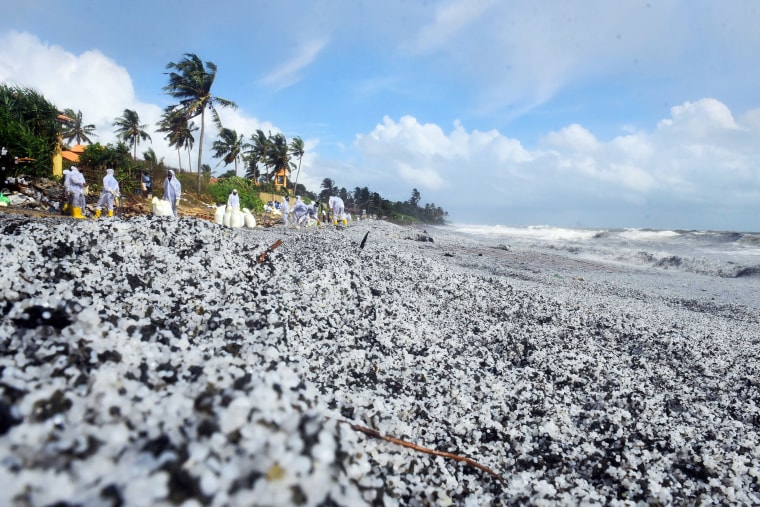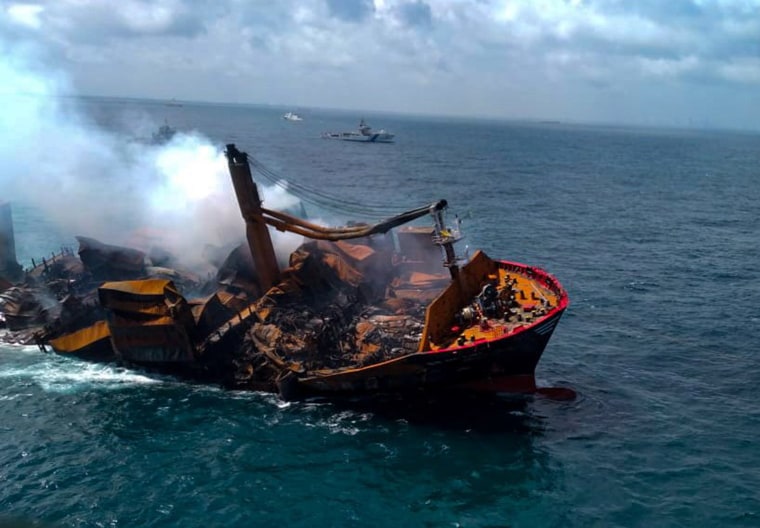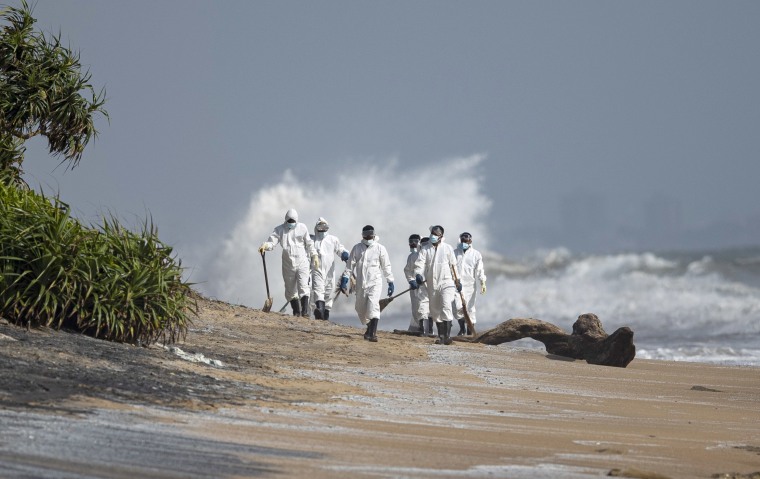A cargo ship laden with chemicals sank Wednesday after nearly two weeks ablaze off the west coast of Sri Lanka, worsening fears of an environmental disaster.
The vessel has already covered the coastline in tons of plastic pellets, and it threatens to spill oil into its rich fishing waters.
The government has banned fishing, a crucial economic industry, along about 50 miles of coast in the wake of the incident. Authorities have also deployed hundreds of soldiers to clean beaches and have warned residents not to touch the debris because it could be contaminated with harmful chemicals.
Download the NBC News app for breaking news and politics
Pamunugama beach, north of the capital, Colombo, is nearly directly opposite where the Singapore-flagged X-Press Pearl has been anchored since a fire erupted onboard May 20.
Since then, millions of beadlike bits of plastic have washed up from the fire-ravaged ship and turned the once-vibrant tropical shore into a scene from one of Sri Lanka's worst marine disasters.
Marine biologist Asha de Vos, 41, said that when she stepped onto the beach Wednesday, the scene hit her like a brick wall.
Where there were once gold sand and coconut trees, she said, there is now a sea of plastic waste.

"I have dedicated my life to protecting and taking care of the ocean around Sri Lanka," said de Vos, an executive director of Oceanswell, a marine conservation research and education organization in Colombo.
"We work so hard to look after and protect this," she said. "It was heartbreaking to see it this way."
De Vos said one of the soldiers clearing the pellets at Pamunugama beach told her that they have been taking away as many as 3,000 bags a day.
"But I was watching the waves coming in and just bringing in more," she said.
Sri Lanka, which is famous for its beautiful coastlines, has emerged as a budding tourism destination in recent years after its civil war ended in 2009. But tourism took a heavy hit from the Covid-19 pandemic and the 2019 Easter terrorist attacks.

Fisheries Minister Kanchana Wijesekera tweeted Wednesday that emergency prevention measures were being taken to protect the lagoon and surrounding areas to contain the damage from any debris or in case of an oil leak.
A navy spokesman, Capt. Indika Silva, said by phone Wednesday that an effort to tow the ship into deeper waters was not successful and had to be abandoned halfway through, as the rear part of the ship had sunk and was resting on the sea floor while the bow remained afloat.
Silva said that water was in the ship and that authorities' main concern was the possibility of an oil spill, although they had not yet observed any oil slicks.
"We stand ready with all necessary equipment to respond," Silva said.
X-Press Feeders, which owns and operates the ship, confirmed in a statement that efforts to move it to deeper waters away from the coastline had failed.
Wijesekera tweeted later Wednesday that booms and skimmers would be used around the vessel in case of an oil spill. There are also contingency plans for full beach cleanups, he said.
The fire-ravaged ship was transporting 1,486 containers, including 25 tons of nitric acid, along with other chemicals and cosmetics.
As the fire was being extinguished, flaming containers laden with chemicals fell from the deck or broke open on it, spilling their cargo into the sea.
"It's the worst environmental disaster for Sri Lanka," Charitha Pattiaratchi, a professor of coastal oceanography at the University of Western Australia, said by phone from Perth, Australia.
Pattiaratchi said he was most concerned about the possibility of an oil spill should the ship sink completely, leaking its fuel into the ocean "sooner or later." The ship was carrying nearly 300 tons of heavy fuel oil, its owner said.
There was also uncertainty about the exact nature of the chemicals in the more than 1,400 containers aboard, he said.

The Marine Environment Protection Authority said on its Facebook page Tuesday that six cleanups were being conducted at 14 locations. X-Press Feeders said Wednesday that it was working with local authorities to help clean up the shoreline.
Pattiaratchi said that plastic pellets have been a scourge for oceans around the world, with an estimated 230,000 tons entering oceans every year, and that the estimated 3 billion spilled off Sri Lanka are likely to migrate into other parts of the ocean.
Pattiaratchi said he expects them to make it as far as Indonesia and the Maldives in the next 40 to 50 days.
The pellets, which are notoriously difficult to clean up, are likely to stay in the environment "for generations," he said.
Although they are not known to be toxic to humans, Pattiaratchi said, they can endanger marine wildlife by getting caught in the gills of fish or ingested by sea turtles.
Television channels in Sri Lanka have been showing dead fish, turtles and other marine life that has washed ashore in recent days.
While dealing with the plastic pellets has been challenging enough, de Vos said, an oil spill would add another layer of complexity.
"Imagine this black oil washing up on these beaches, where we now have this plastic snow, basically," she said.
"We are hoping we don't have to face that."
